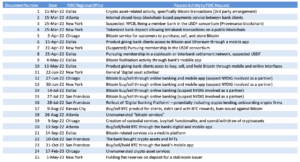- Ethereum’s validator activity decreases by 1%, signaling potential unstaking and diminished investor interest in its network security.
- Ethereum’s performance lagged significantly behind Bitcoin in 2024, with upgrades like Dencun failing to capitalize on major market trends.
Ethereum’s performance and prospects for 2025 are under scrutiny as analysts critique its ability to compete effectively with Bitcoin and other blockchain platforms. Despite its position as the second-largest cryptocurrency, Ethereum faces challenges that could impact its value proposition and investor confidence.
Declining Validator Activity and Staking Concerns
Ethereum’s active validator count dropped by 1% in late 2024, raising concerns about potential unstaking trends. Staking, a critical component of Ethereum’s proof-of-stake mechanism, offers diminishing yields compared to traditional financial instruments like Treasury bonds.
Currently, staking returns hover around 3%, significantly lower than Bitcoin’s annualized growth and traditional fixed-income options. This disparity highlights Ethereum’s reliance on staking for network security, while user demand for decentralized finance (DeFi) and other blockchain applications remains stagnant.
Lagging Performance and Missed Opportunities
Ethereum underperformed Bitcoin by 70% in 2024, with returns of 48% compared to Bitcoin’s 121.4% rise. The Dencun upgrade, launched in March 2024, failed to capitalize on key market events, such as the meme coin rally, which instead benefited cost-effective platforms like Solana.
Similarly, Ethereum ETFs launched mid-year attracted only $2.66 billion in inflows, dwarfed by Bitcoin’s $35.3 billion from spot ETFs. These missed opportunities underscore Ethereum’s struggle to sustain growth amid increasing competition.
Stagnation in User Activity
Weekly Ethereum transactions peaked at 11 million in May 2021 and currently average 9 million, with active addresses plateauing between 300,000 and 400,000. This stagnation contrasts with the rising adoption seen in alternative blockchains like Tron, which has gained market share in stablecoin issuance.
Vitalik Buterin, has sparked discussions around his potential nomination for a Nobel Prize in economics. Ryan Sean Adams, founder of Bankless, recently highlighted the disconnect between traditional economic theories and modern financial innovations, suggesting that Buterin’s oversight for such recognition underscores a gap in contemporary economic engagement.
Buterin’s contributions transcend the development of Ethereum; they challenge foundational economic theories. On “The Marginal Revolution Podcast“ economists Alex Tabarrok and Tyler Cowen acknowledged the lack of substantial crypto-related contributions from leading economists, while also noting Buterin’s impactful discourse on topics traditionally reserved for academic economists.
Should Vitalik Buterin win a Nobel Prize in economics for Ethereum? pic.twitter.com/oyaWwaWTNd
— Mercatus Center (@mercatus) October 8, 2024
Refuting Traditional Economic Theories
Buterin has notably challenged the regression theorem of Ludwig von Mises, which posits that the value of money is rooted in its historical utility and intrinsic value—a theory seemingly at odds with the concept of cryptocurrencies like Bitcoin and Ethereum, which lack both historical utility and intrinsic value.
Vitalik Buterin deserves a Nobel prize in economics for his work on crypto and Ethereum.
The fact that he’s barely considered shows how much ivory tower economists are disconnected from applied theory.
Future generations will judge their absence in harshly.
Crypto is the…
— RYAN SΞAN ADAMS – rsa.eth 🦄 (@RyanSAdams) January 1, 2025
Ryan S. Adams suggests that Vitalik Buterin deserves a “Nobel prize in economics” for his work on Ethereum, highlighting that “ivory tower” economists are disconnected from applied theory and that “Future generations will judge their absence in harshly”.
Some view Ethereum as a simulation of a federal reserve system without government interference, underscoring the necessity of such innovations.
Additionally, there’s mention of the possibility that Buterin could be considered for the Nobel Peace Prize, although others criticize the politicization of Nobel awards and suggest that figures like Satoshi Nakamoto or Emin Gun Sirer also deserve recognition.
Nobel Prize Considerations
While the anonymity of Satoshi Nakamoto, the creator of Bitcoin, presents a conventional choice for such recognition, the ambiguity surrounding his identity—and remarks by figures like Galaxy CEO Mike Novogratz suggesting Satoshi might be deceased—places Buterin as a forefront figure in the discourse on cryptocurrency’s economic impact.
[mcrypto id=”12523″]
Ethereum (ETH) is currently priced at $3,356.40 USD, with a 24-hour trading volume of $13.36 billion USD.
This represents a modest increase of 0.43% in the last 24 hours, although it has seen a decline of 3.32% over the past week.
Ethereum’s market capitalization stands at approximately $404.37 billion USD, solidifying its position as the second-largest cryptocurrency by market value.
Key Observations:
- Daily Price Movements:
- ETH has traded within a range of $3,313.15 USD to $3,362.67 USD over the past day, reflecting relatively stable market conditions.
- Ethereum remains 31.78% below its all-time high of $4,878.26 USD, achieved in November 2021, indicating significant room for potential recovery.











